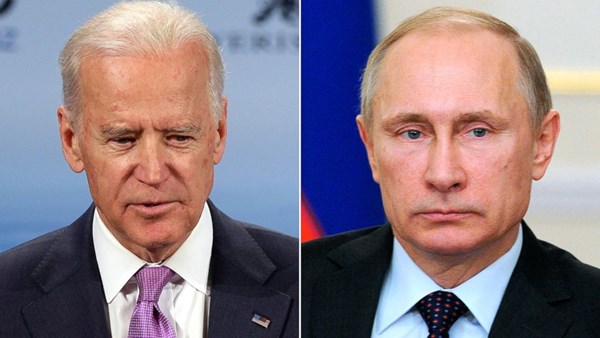Putin convinces Biden not to impose sanctions against Russian oligarchs and Nord Stream 2
The United States withdrew all amendments on sanctions against Russia from the draft defense bill for 2022 after negotiations between Joe Biden and Vladimir Putin.
The two-hour online summit, which the presidents held face to face, even sending interpreters to the other rooms, was the third conversation between Putin and Biden and took place after Russia moved almost all Russian troops stationed west of the Urals to the border with Ukraine.
Biden "expressed concern" on behalf of the United States and European allies about the "build-up of forces" and warned Putin about "serious economic" and other measures if Russia decides to escalate the situation, the White House press service said.
Biden called for a return to diplomacy, and both presidents gave their teams tasks to prepare groundwork, the press service reported.
Shortly after the end of the negotiations, the final draft defense bill for 2022 was submitted to the US Congress. It no longer had the amendments on anti-Russian sanctions.
In particular, it was decided to abandon measures against 35 Russian "kleptocrats", including oligarchs and propagandists, which were proposed in late September in response to the poisoning and sentencing of the Russian opposition leader, Alexei Navalny.
The potential "blacklist" of those, who could face risks of losing assets and visa bans, included billionaires Roman Abramovich, Oleg Deripaska, Gennady Timchenko, VTB President Andrei Kostin, Gazprom CEO Alexei Miller, Rosneft CEO Igor Sechin, FSB Director Alexander Bortnikov, Investigative Committee Head Alexander Bastrykin, National Guard Commander Vikok Zolotov, CEO of “Channel One Russia” Konstantin Ernst, TV Host Vladimir Solovyov, RT news network editor-in-chief Margarita Simonyan and others.
For now, they have avoided the threat of sanctions. Also, restrictions on the Nord Stream 2 operator, Nord Stream 2 AG, and tightening restrictions on investments in the Russian national debt (with expansion to the secondary market) were excluded from the draft budget bill.
At the same time, it was decided to increase the financing of measures for military deterrence of Russia to $ 4 billion (instead of the original plan of $ 3.5 billion). Military assistance to Ukraine will amount to $ 300 million - $ 50 million more than the Pentagon originally requested.
Putin, according to the Kremlin’s press service, told Biden about Kyiv's "destructive course" to dismantle the Minsk agreements, accusing NATO of trying to "develop Ukrainian territory" and build up military capacity near the Russian borders.
Putin also said that Moscow is interested in obtaining legal guarantees that NATO will not expand to the east and will not deploy offensive strike systems in Russia's neighboring countries.
The Kremlin said that an agreement was reached on the beginning of "substantive consultations" on this issue.
Biden did not give Putin a commitment that Ukraine would remain outside of NATO, but on the contrary, stressed that no one has the right to decide who should be invited into the alliance and who should not, said National Security Advisor Jake Sullivan.
Putin also proposed to remove all restrictions on the work of diplomatic missions, which lead to Russians not being able to obtain American visas. But Biden seems to have refused this proposal. The White House press release doesn't even mention the embassies issue. According to Sullivan, this topic was not directly touched upon at all in the negotiations.
After the talks, the head of the US Senate International Committee, Democrat Bob Menendez, said that he was preparing the "mother of all sanctions” with "devastating consequences" for the Russian economy in the event of Russia’s invasion of Ukraine.
US Deputy Secretary of State Victoria Nuland, in turn, clarified that Europe would have to say goodbye to the Nord Stream 2 pipeline and Germany is ready to take measures against Gazprom. In addition, measures are being prepared to completely isolate Russia from the global financial system, if the war does begin, she said, speaking before the Senate Committee on Foreign Affairs.
